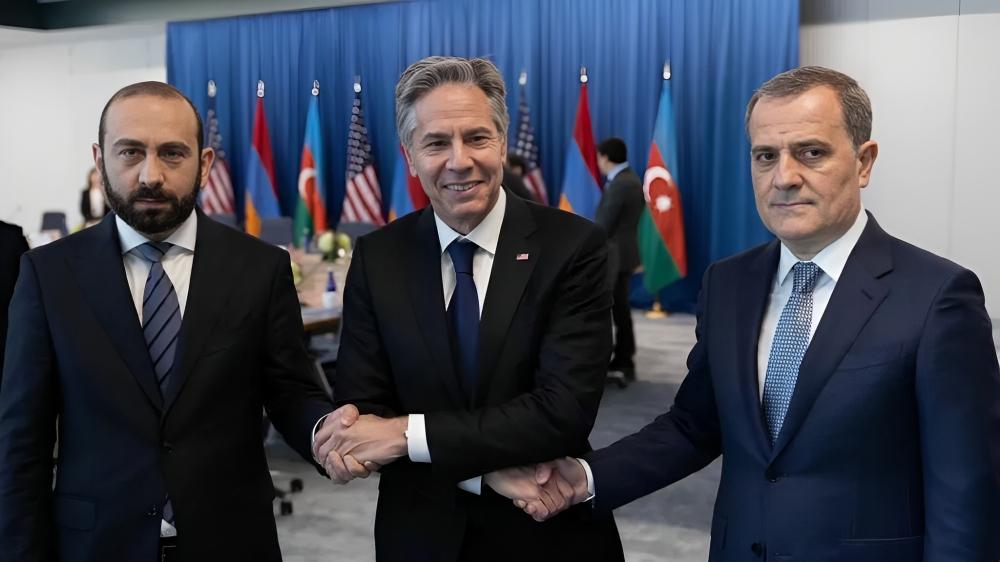The facade of urgency: Simonyan’s optimism and Aliyev’s realism Aligning statements with actions
Adnan Huseyn, founder of re:Azerbaijan, has recently shared an article on the online publishing platform Medium, contemplating about the latest statement of the Armenian parliament speaker who expressed his country’s readiness to conclude the peace agreement with Azerbaijan. Caliber.Az reprints the article.
On November 28, as reported by Mediamax.am, Chairman of Armenia’s National Assembly Alen Simonyan stated, “the peace agreement with Azerbaijan can be signed within the next 15 days if Baku demonstrates political will.”
He added that nearly all fundamental issues have been agreed upon. This announcement projects a sense of Armenian readiness and urgency in concluding the peace process.
However, this narrative is significantly challenged by the realities of the ongoing negotiations. Azerbaijani President Ilham Aliyev, in a call with U.S. Secretary of State Antony Blinken on November 27, highlighted a critical aspect that casts doubt on Armenia’s portrayed readiness.
President Aliyev revealed that Armenia took 70 days to respond to Azerbaijan’s peace treaty proposal, submitted on September 11, 2023, with Armenia only sending its comments on November 21.
He pointedly remarked that this “70-day long delay demonstrates again that Armenia misuses the text of the peace treaty as a pretext for the prolongation of the negotiations process.” This delay is a significant deviation from the sense of urgency conveyed by Simonyan and suggests a possible strategic manoeuvre by Armenia to extend the talks.
Simonyan’s claims about Azerbaijan avoiding meetings are directly contradicted by the Azerbaijani Ministry of Foreign Affairs statement on November 21. The Ministry declared, “Azerbaijan stands ready for direct negotiations with Armenia on a bilateral basis to finalize the peace agreement as soon as possible.”

This readiness for direct dialogue starkly contrasts with Simonyan’s own words: “I don’t understand why Azerbaijan avoids meetings of different formats.” The Azerbaijani statement, which also indicates flexibility in negotiating the venue for the next round of talks, underscores Azerbaijan’s proactive stance.
Azerbaijan has consistently demonstrated its readiness to engage in necessary processes as the initiator of peace talks and the normalization of relations with Armenia. In contrast, the Armenian side has frequently opted for delaying tactics, exhibiting a pattern of inconsistency. This is evident in Armenia’s lack of proactive response to engage in direct talks with Azerbaijan and its efforts to involve third-country mediators, who are often perceived as having a biased stance against Azerbaijan.
Such actions suggest that Armenia, rather than genuinely pursuing peace, may be seeking an alternative outcome that aligns more closely with its own interests, an outcome unlikely to be accepted by Azerbaijan. This strategy is underscored by the nature of statements like the one recently made by Simonyan, which appear designed to cast doubt on Azerbaijan’s commitment to the peace process and to mislead the international community regarding Armenia’s intentions.
These statements, insincere and populist in nature, seem to be part of a broader effort by Armenia to manipulate the narrative of the negotiations, creating an illusion of goodwill and readiness for peace that is belied by their actions in the diplomatic arena.
For peace negotiations to progress effectively, it is crucial for Armenia to engage directly and sincerely with Azerbaijan, aligning its public statements with actions. This requires moving beyond populist rhetoric to demonstrate a real willingness to resolve the conflict through honest and direct negotiations. The path to lasting peace in the post-conflict period depends on both parties’ commitment to transparent and constructive dialogue, free from strategic delays and misleading narratives.








